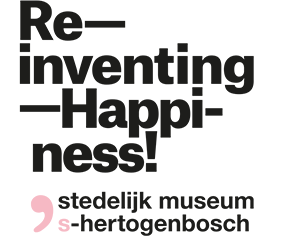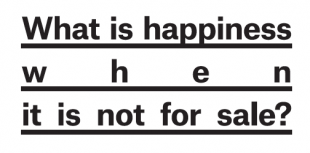English summary
Can a new definition of happiness offer new prospects for the future? On Saturday 8 March, the Stedelijk Museum ’s-Hertogenbosch will launch Reinventing Happiness. In this three-year research project, the museum will go in search of new, social, sustainable forms of happiness with the help of artists, visitors, and local residents. What if happiness can be found in unexpected encounters? What do work, depression and cheer have to do with each other? And do green spaces in cities make us happier? Leading the studies will be the artist duo Sjaak Langenberg & Rosé de Beer; the artist Jeanne van Heeswijk, working with the theatremaker Paul de Bruyne; and the artist and designer Frank Bruggeman. The first segment of the 2014 edition of Reinventing Happiness consisted of a range of events at the museum, including unusual encounters, talks, readings, discussions, documentations, performances and an installation. This segment concluded with a public picnic on Sunday 15 June and the launch of an inspirational Reinventing Happiness newspaper.
The three Reinventing Happiness projects are:
NEW MANNERS by Sjaak Langenberg & Rosé de Beer
How can we replace silent agreements, role patterns and happiness theories with improvisation and action?
Public space often doesn’t invite us to communicate, yet a simple compliment or unexpected moment of contact can greatly increase feelings of happiness. In restaurants, we don’t interact with fellow diners. On a train, travellers concentrate on their smartphones rather than each other, unless a points failure brings the train to a halt. It’s the same in museums: individual visitors usually don’t communicate with each other, and attendants watch them in a friendly yet silent manner. That’s the silent agreement.
Taking these observations as a starting point, the artist duo Sjaak Langenberg & Rosé de Beer are beginning an experimental study of new manners that could contribute to increased well-being. At work or at home, decorum and ingrained habits can get in the way of happiness. Sometimes we focus blindly on a task while we could be using different talents to make our relationships with others better and more personal. How do we escape this straitjacket?
In the first edition, the museum became Sjaak Langenberg & Rosé de Beer’s temporary test lab. They deployed “super-attendants” to introduce new manners and break through conventions. These “super-attendants” – including theatremakers Peter de Graef and Lucas de Man, NRC Handelsblad and Happinez columnist Marjoleine de Vos, philosopher Ann Meskens, physiotherapist Paulette Verloop, cabaret performer Vincent Bijlo, radio producer Pat Donnez, city chronicler Eric Alink, writers Mijke Pol and Lucas de Waard, medical entomologist Bart Knols, hairdresser Leona Priem and “collector of special moments” Janne Willems – surprised visitors and conversed with them about happiness and the strange social habits of human beings.
The second edition ....
STAGED HAPPINESS by Jeanne van Heeswijk and Paul de Bruyne
The search for happiness is conducted in such an intense, all-encompassing way that it makes many people deeply unhappy. A vicious circle arises as our collective depression sends us on a new quest for happiness. The cycle seems inevitable and doomed. Escape is no longer possible.
That’s why artist Jeanne van Heeswijk and theatre maker Paul de Bruyne are throwing themselves into the search for satisfaction for Reinventing Happiness. The results of their unique collaborative project Staged Happiness can’t be predicted. It will start with no certainties and few assumptions, but with the idea that a sitcom or blijspel – a Dutch term for situation comedy – will serve as a good launch pad. The word seems to come from another time and place, when happiness was an everyday thing. It’s a destination you arrive at by doing.
Comedy rests on the pleasure of shared frivolity. So Van Heeswijk and De Bruyne are looking for players willing to venture fearlessly onto the field and throw themselves into the game – a desperate search for natural happiness in an age when manufactured, reproducible bonheur is for sale in potion and pill form.
To get the party started, the artists held public auditions for a “happiness play” at the museum. Everyone interested was invited to come and contribute his or her own personal experience, imagination, body and soul. The auditions in themselves were sure to deliver a taste of unparalleled happiness.
Museum visitors who made an audition and willing to continue to work with Jeanne and Paul are now practicing a first play at the Noorderpoort....
NATURE AS PUBLIC PROPERTY by Frank Bruggeman
Windowsill happiness or new wilderness?
The work of the artist and designer Frank Bruggeman centres around how we handle urban nature. For Reinventing Happiness, he turns his gaze on the urban green spaces of ’s-Hertogenbosch. How green is the city, and which forms does its green space take? Does nature merely allow us to passively experience it, or do city residents have some control? Questions like these will guide a research project and exhibition on restrained nature, unspoiled nature, and everything in between.
Today, fewer and fewer new homes come with traditional windowsills. Meanwhile, more and more of them have “outdoor windowsills”: tiny front gardens that can be decorated with a few plants and other attributes. Can old-fashioned and new-style windowsills tell us anything about the happiness of a home’s residents? And which ecological values do these windowsills express?
The Dutch landscape is highly urbanised. Maybe that’s why we find unspoiled nature so fascinating. When the new wilderness occasionally appears at the boundaries of our cities, it’s an unexpected gift for nature lovers and planners. But what should we do to lure the new wilderness into town? Or would we rather it stayed outside?
Nature in cities affects our health and well-being. Research shows that people who live in leafy neighbourhoods are significantly happier than residents of the concrete jungle. Hospital patients who can see trees out the window recover faster. Nature makes people less impulsive and more oriented towards sustainable and long-term solutions. But not every kind of nature contributes equally to our well-being. Working in an experimental fashion with local residents and museum visitors, Frank Bruggeman aims to find the green spots that make people really happy in ’s-Hertogenbosch.

